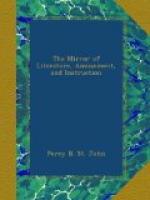To Paer accordingly they went, who received him kindly, and referred him to his own teacher, the old and experienced “Maestro di Capella” Giretti, from Naples, who gave him instructions for six months, three times a-week in counterpoint. During this period he wrote twenty-four Fugues for four hands, with pen, ink, and paper alone, and without any instrument, which his master did not allow him, and, assisted by his own inclination, made rapid progress. The great Paer also took much interest in him, giving him compositions to work out, which he himself revised: an interest for which Paganini ever afterwards showed himself deeply grateful.
The time was now come when Nicolo was destined, like other youthful prodigies, to be hawked about the country, to fill the pockets of his mercenary father, who managed to speculate upon him with considerable success in Milan, Bologna, Florence, Pisa, Leghorn, and most of the upper and central towns of Italy, where his concerts were always well attended. Young Paganini liked these excursions well enough, but being now about fifteen years of age, he began to be of opinion that they would be still more agreeable if he could only contrive to get rid of the old gentleman, whose spare diet and severe discipline had now become more irksome to him than ever. To accomplish this desirable object, an opportunity soon offered. It was the custom of Lucca, at the feast of St. Martin, to hold a great musical festival, to which strangers were invited from all quarters, and numerous travellers resorted of their own accord; and as the occasion drew near, Nicolo begged hard to be allowed to go there in company with his elder brother, and after much entreaty, succeeded in obtaining permission. He made his appearance as a solo player, and succeeded so well, that he resolved now to commence vagabondizing on his own account—a sort of life to which he soon became so partial, that, notwithstanding many handsome offers which he occasionally received to establish himself in several places, as a concerto player or director of the orchestra, he never could be persuaded to settle any where. At a later period, however, he lived for some time at the court of Lucca, but soon found it more pleasant and profitable to resume his itinerant habits. He visited all parts of Italy, but usually made Genoa his head-quarters, where, however, he preferred to play the part of the dilletante to that of the virtuoso, and performed in private circles without giving public concerts.
It was not long before he had amassed about 20,000 francs, part of which he proposed to devote to the maintenance of his parents. His father, however, was not to be put off with a few thousands, but insisted upon the whole.—Paganini then offered him the interest of the capital, but Signor Antonio very coolly threatened him with instant death unless he agreed to consign the whole of the principal in his behalf; and in order to avert serious consequences, and to procure peace, he gave up the greater part of it.




